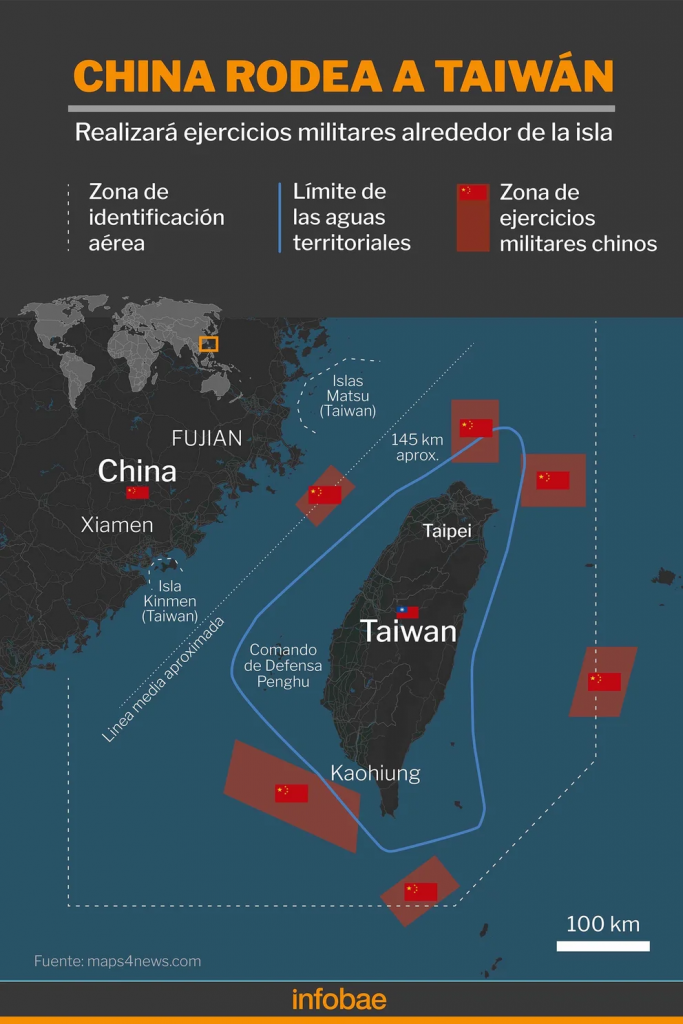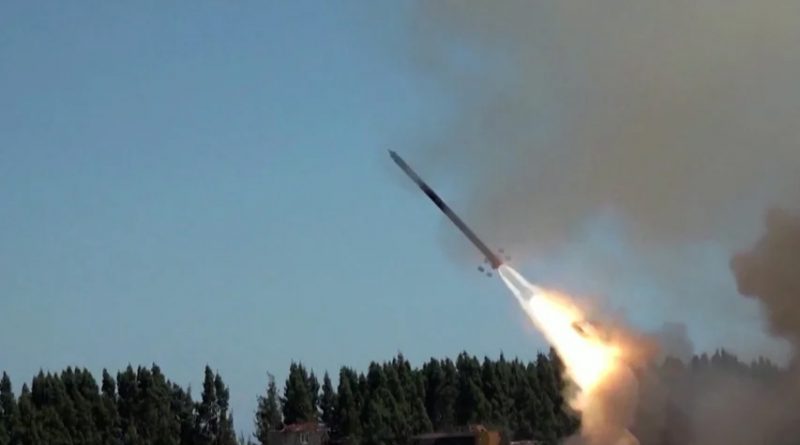China bloquea a Taiwán y amenaza: “Podemos lanzar ataques cuando queramos, como queramos y apuntando a donde queramos” / Taiwan on edge in wake of China’s show of force
Los ejercicios con munición real alrededor de la isla prueban blancos a larga distancia y los militares aseguran que están listos para atacar la isla cuando se les ordene: “Quienes juegan con fuego se quemarán a sí mismos”
El profesor de la Universidad de Defensa Nacional del Ejército Popular de Liberación (EPL) y experto militar chino, Meng Xiangging, aseguró este viernes que las operaciones de combate del EPL establecieron un cerco militar alrededor de Taiwán, se realizarán desde el 4 hasta 7 de agosto e incluyen novedades tecnológicas que ponen de manifiesto la “poderosa capacidad de munición real de las fuerzas armadas de China”.
“El sistema de tiro a distancia de nuestro ejército tiene un alcance muy largo y puede cubrir toda la isla de Taiwán. Esto significa que somos capaces de lanzar ataques cuando queramos, como queramos y apuntando a donde queramos”, amenazó Xiangging en una entrevista en la Televisión Central (CCTV) citada también por la agencia estatal Xinhua. Indicó, además, que los sistemas de disparo a distancia están equipados con sistemas de transporte de alta movilidad, lo que les permite accionar y detenerse en cualquier momento.
“Nuestro sistema de tiro a distancia es rentable y el coste de munición es bajo y a través de nuestro sistema industrial, rápidamente se pueden producir municiones en grandes cantidades”, alardeó.
Durante la entrevista el militar indicó que los ejercicios en el Estrecho de Taiwán también han incluido misiles convencionales que “demuestran su avanzado nivel de precisión, largo alcance y gran cobertura”. Meng Xiangging reiteró las amenazas contra sus adversarios al manifestar que “aquellos que juegan con fuego, se quemarán a sí mismos”.

Por su parte, el portavoz de las fuerzas militares chinas, Shi Yi, indicó que las maniobras, que empezaron el jueves al mediodía incluyeron “disparos de misiles convencionales” hacia las aguas de las costas orientales de Taiwán. “Todos los misiles alcanzaron el objetivo con precisión”, agregó. Taiwan calificó el hecho como Son “acciones irracionales que socavan la paz regional”.
Sin embargo, además de la condena internacional por la escalada que representa el bloqueo a la isla y las pruebas que lleva a cabo el régimen de Xi Jinping, Japón ha denunciado que misiles disparados durante esos ejercicios han caído en su Zona Económica Exclusiva, lo que motivó una enérgica queja diplomática.
En un reporte la agencia oficial Xinhua se informaron las seis zonas de las maniobras para rodear la isla y lograr el cierre del espacio marítimo y aéreo para esas áreas. Las prácticas estarán a 20 kilómetros de la costa de Kaohsiung, la principal ciudad del sur de Taiwán.
El Ministerio taiwanés de Defensa denunció la grave violación de las aguas territoriales y de su soberanía, no reconocida por China. “Esta es una acción irracional que desafía el orden internacional”, destacó el ministro Sun Li-fang. Según describió, los ejercicios equivalen a un “bloqueo marítimo y aéreo” de Taiwán y advirtió que las fuerzas taiwanesas “responderán a cualquier acción”.
Estados Unidos, por su parte, citó al embajador chino Qin Gang a la Casa Blanca para plantear el tema de Taiwán. Este viernes China anunció la interrupción del diálogo de alto nivel con EEUU y sancionó a la presidenta de la Cámara de Representantes estadounidense, Nancy Pelosi, por considerar que la líder demócrata “interfirió” en asuntos internos de la isla.
Para Beijing. la visita de Pelosi rompió el “principio de una sola China que rige el país y una amenaza para la paz y la estabilidad en el estrecho de Taiwán.
(Con información de EFE, NYT, Reuters y Europa Press)

Taiwan on edge in wake of China’s show of force
After Nancy Pelosi’s visit, China conducts its largest military drill in decades around the island. Some Taiwanese are worried; others have grown numb to Beijing’s threats.
As Nancy Pelosi, the speaker of the US House of Representatives, departed Taipei Wednesday after meeting with President Tsai Ing-wen and making a “bedrock promise” that the United States will “always stand with Taiwan,” the island is preparing for China to respond with a massive show of military force.
Pelosi was the highest-ranking US official to visit Taiwan in 25 years. Beijing considers self-governing Taiwan as Chinese territory and lashes out at such high-level visits from US officials, along with anything that would suggest Taiwan is an independent country.
Although the US holds no formal diplomatic relations with Taiwan, Washington is Taipei’s most significant political and military backer.
“Now, more than ever, America’s solidarity with Taiwan is crucial, and that’s the message we are bringing here, today,” Pelosi said.

“If the speaker of the US House of Representatives is willing to come to Taiwan to validate the relationship with Taiwan from a democratic perspective, this will influence other democratic leaders,” said Wei-Ting Yen, a Taiwanese political science professor at Franklin and Marshall College in the US.
China responds with show of force
After Pelosi arrived Tuesday night, Beijing announced live-fire military drills in six maritime blocks surrounding Taiwan starting Thursday and lasting until Sunday.
Shi Yi, spokesperson for the Eastern Theater Command of the Chinese People’s Liberation Army (PLA), said in a statement that the military operations are “deterrence against the major escalation” by the US on the “Taiwan question.”
The drills are a “grave warning” toward “separatist actions of Taiwan independence forces,” it added.
The statement said the exercises would involve “naval-air joint drills … long-range live ammunition shooting” in the Taiwan Strait and “conventional missile firepower test launching,” off the island’s east coast.
In providing the locations for the exercises on a map, China’s official Xinhua News Agency advised ships and aircraft to avoid the areas where the drills are set to take place.
On Wednesday, the Defense Ministry in Taipei said some of the PLA’s live-fire drills appear to violate Taiwan’s territorial waters, which extend 12 nautical miles (22 kilometers) from the coast.
The Defense Ministry said the Chinese-designated “exclusion zones” amount to a “maritime and aerial blockade” of Taiwan, which threatens shipping lanes and flight routes.
“They overlap with our territorial waters and airspace and severely violate our sovereignty,” said ministry spokesperson Yu Chien-chang.
The last time China carried out a show of force of this magnitude near Taiwan was during the 1995-96 “Third Taiwan Strait Crisis,” which was a response to a US visit by Taiwan’s first democratically elected president, Lee Teng-hui.
“We have not seen Beijing planning these live-fire drills for some time, but it’s also something we know they would do,” said Lev Nachman, a political science professor at National Chengchi University in Taiwan.
“China is definitely using heavier military and intimidation tactics, but they are not escalating to a point we haven’t seen before,” Nachman stressed.
Would the US intervene if China attacked?
Under the “Taiwan Relations Act,” the US pledges to assist in Taiwan’s defense but does not stipulate a commitment of direct military intervention. Washington maintains a stance of “strategic ambiguity” on military intervention in Taiwan.
However, recent remarks by President Joe Biden that the US would “defend” Taiwan if the island were attacked by China raised eyebrows and forced the White House to clarify that Washington had not changed its stance.
“We are supporters of the status quo; we don’t want anything to happen to Taiwan by force,” Pelosi said Wednesday after meeting with President Tsai.
Since coming to power in 2013, Chinese President Xi Jinping has prioritized “reunification” with Taiwan and has not ruled out using force to do so.
Since last year, Beijing has increased its military pressure on Taipei by dispatching large numbers of fighter jets into Taiwan’s air defense identification zone on an almost daily basis. Experts have long voiced concerns about a military conflict caused by a miscalculation by either side.
“I think the incentives in Beijing are not to start a full-scale conflict, and they have reason to try to keep whatever escalation of threats or pressure on Taiwan under strict limits. Depending on what they do, it raises the chances of an accident,” said Kharis Templeman, a Taiwan expert at Stanford University’s Hoover Institute.
Vincent Chao, a former director at Taiwan’s de facto embassy, the representative office, in Washington, DC, said that “US support for Taiwan’s security is key for peace and stability across the Taiwan Strait.”
“From the Taiwanese perspective, trips like this are valued. People in Taiwan see high-level engagement between Taipei and Washington as an important part of Taiwan’s peace and security,” he noted.
How are Taiwanese responding?
Since Russia launched its invasion of Ukraine at the end of February, people in Taiwan have been on alert, watching to see whether China has been emboldened to carry out a similar attack.
“Since the war in Ukraine, I don’t think the international community’s concern about Pelosi’s trip triggering a potential military conflict is overly exaggerated,” said Mengying Yang, a marketing professional in her 30s.
However, “many Taiwanese people have grown numb to Beijing’s call of using force to reunite with Taiwan if necessary,” she pointed out.
Kuan-Ting Chen, CEO of the Taiwanese think tank NextGen Foundation, said that many people in Taiwan think “the best way to deal with this intimidation is to maintain their normal lives, since Beijing has been repeating the same level of threats over the last few decades.”
“They have grown used to Beijing’s intimidation,” he underlined.
Others told DW that the uncertainty surrounding the level of China’s response is disconcerting.
“I’m certain that the retaliation will be multi-faceted, including military, economic and diplomatic retaliation,” said Chiaoning Su, an academic in Taipei.
“While Taiwanese people are all mentally prepared for these retaliations, I’m still concerned about the degree of China’s measures,” she added.
Edited by: Srinivas Mazumdaru


Debe estar conectado para enviar un comentario.